

Promoting Open Knowledge in a Digital Age. OKFN Labs. The Free Information Society - Educating and Entertaining since 2003. OKCon - Open Knowledge Conference. Señor Presidente Rafael Correa - Software Libre Campus Party. Hacia una pachamama del conocimiento común y abierto. Global Open Access Portal. The Global Open Access Portal (GOAP) funded by the Governments of Colombia, Denmark, Norway, and the United States Department of State, presents a current snapshot of the status of Open Access (OA) to scientific information in 158 countries worldwide.
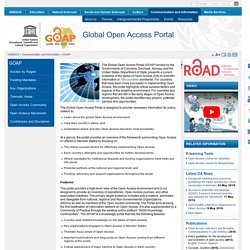
For countries that have been more successful in implementing Open Access, the portal highlights critical success factors and aspects of the enabling environment. For countries and regions that are still in the early stages of Open Access development, the portal identifies key players, potential barriers and opportunities. The Global Open Access Portal is designed to provide necessary information for policy-makers to: Learn about the global Open Access environment;View their country’s status; andUnderstand where and why Open Access has been most successful. Category:Open access (publishing) GreyNet International, Grey Literature Network Service. OpenGrey. Open Knowledge and Open Data. Open access. Research publications that are distributed online, free of cost or other access barriers Open access (OA) is a set of principles and a range of practices through which research outputs are distributed online, free of cost or other access barriers.[1] With open access strictly defined (according to the 2001 definition), or libre open access, barriers to copying or reuse are also reduced or removed by applying an open license for copyright.[1] The main focus of the open access movement is "peer reviewed research literature.
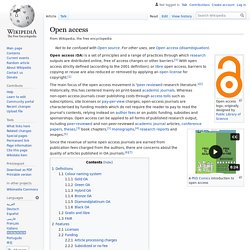
"[2] Historically, this has centered mainly on print-based academic journals. Whereas conventional (non-open access) journals cover publishing costs through access tolls such as subscriptions, site licenses or pay-per-view charges, open-access journals are characterised by funding models which do not require the reader to pay to read the journal's contents. Definitions[edit] Colour naming system[edit] Gold OA[edit] Green OA[edit] Green OA is gratis for the author. Directory of Open Access Journals. List of open-access journals. This is a list of open-access journals, by field.

The list contains selected, particularly notable journals with at least some free content, available through all forms of open access, including delayed open access, and hybrid open access. It only includes individual journals, not collections or indexing services. Agriculture[edit] Open Access Journal of Medicinal and Aromatic Plants Biology[edit] Computer science[edit] Chemistry[edit] Dance[edit] Contact Quarterly Educational technology[edit] Engineering[edit] Advances in Production Engineering & Management Environmental studies[edit] General science[edit] Higher education[edit] Search through over 11 million science, health, medical journal full text articles and books. Open Access Directory. Category:Open access journals. Category:Open content.
From Crowdfunding To Open Access, Startups Are Experimenting With Academic Research. These days may well be the next golden age for universities, and startups are leading the way.
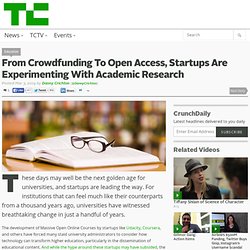
For institutions that can feel much like their counterparts from a thousand years ago, universities have witnessed breathtaking change in just a handful of years. The development of Massive Open Online Courses by startups like Udacity, Coursera, and others have forced many staid university administrators to consider how technology can transform higher education, particularly in the dissemination of educational content. And while the hype around these startups may have subsided, the change in mindset they have engendered means that their influence will continue well into the future. Yet, for all of the splashy accounts on the rise of these new teaching startups, one function of the university has consistently been missed – their research programs. SpringerOpen. EPrints - Digital Repository Software. PLOS. Oapen.com Library. Cptech.org Access to Knowledge. Knowledge is essential for so many human activities and values, including freedom, the exercise of political power, and economic, social and personal development.
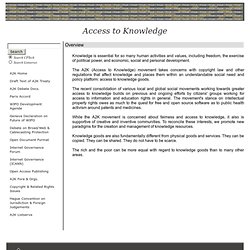
The A2K (Access to Knowledge) movement takes concerns with copyright law and other regulations that affect knowledge and places them within an understandable social need and policy platform: access to knowledge goods. The recent consolidation of various local and global social movements working towards greater access to knowledge builds on previous and ongoing efforts by citizens' groups working for access to information and education rights in general. The movement's stance on intellectual property rights owes as much to the quest for free and open source software as to public health activism around patents and medicines.
Attending and mending the knowledge ecosystem. OpenAIRE. Digital Knowledge Centre. Open Source Physics. Computational Resources for Teaching The OSP Collection provides curriculum resources that engage students in physics, computation, and computer modeling.
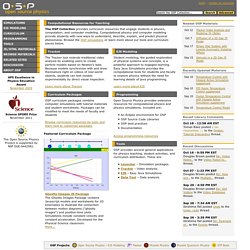
Computational physics and computer modeling provide students with new ways to understand, describe, explain, and predict physical phenomena. Browse the OSP simulations or learn more about our tools and curriculum pieces below. Libre knowledge. Libre knowledge (aka open knowledge or free knowledge) is knowledge which may be acquired, interpreted and applied freely.
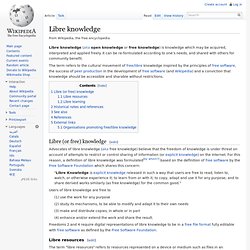
It can be re-formulated according to one's needs, and shared with others for community benefit. The term refers to the cultural movement of free/libre knowledge inspired by the principles of free software, the success of peer production in the development of free software (and Wikipedia) and a conviction that knowledge should be accessible and sharable without restrictions. Libre (or free) knowledge[edit] Advocates of libre knowledge (aka free knowledge) believe that the freedom of knowledge is under threat on account of attempts to restrict or control sharing of information (or explicit knowledge) on the Internet.
For this reason, a definition of libre knowledge was formulated[by whom?] Unlocking the knowledge society. English — Libre.org. Panton Principles. Libre accès à l'information scientifique et technique. OKFestival. Open knowledge. Open knowledge is knowledge that one is free to use, reuse, and redistribute it without legal, social or technological restriction.[1] Open knowledge is a set of principles and methodologies related to the production and distribution of knowledge works in an open manner. Knowledge is interpreted broadly to include data, content and general information. History[edit] Similarly to other 'open' concepts such as open data and open content, though the term is rather new, the concept is old.
For example, one of the earliest printed texts of which we have record is a copy of the Buddhist Diamond sutra produced in China around 868AD, and in it can be found the dedication: "for universal free distribution".[2] Organisations and activities promoting open knowledge[edit] Charter for Innovation, Creativity and Access to Knowledge. The Charter for innovation, creativity and access to knowledge contains suggested legal requirements, guidelines for education and access to knowledge, and structural requirements for a knowledge-based society.
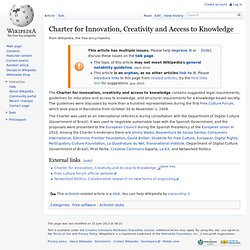
The guidelines were discussed by more than a hundred representatives during the first Free Culture Forum, which took place in Barcelona from October 30 to November 1, 2009. The Charter was used as an international reference during consultation with the Department of Digital Culture (Government of Brazil). OpenContent. SAGE Journals. Why is Open Access Development so Successful? – Stigmergic organization and the economics of information. Open Knowledge and the Public Interest. Knowledge commons. Conceptual background[edit] The term 'commons' is derived from the medieval economic system the commons.
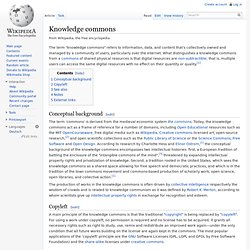
From Digital Libraries to Knowledge Commons. By Yannis Ioannidis Digital Libraries began as systems whose goal was to simulate the operation of traditional libraries for books and other text documents in digital form.
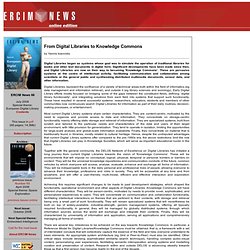
Significant developments have been made since then, and Digital Libraries are now on their way to becoming 'Knowledge Commons'. These are pervasive systems at the centre of intellectual activity, facilitating communication and collaboration among scientists or the general public and synthesizing distributed multimedia documents, sensor data, and other information. Digital Libraries represent the confluence of a variety of technical areas both within the field of informatics (eg data management and information retrieval), and outside it (eg library sciences and sociology). Early Digital Library efforts mostly focused on bridging some of the gaps between the constituent fields, defining `digital library functionality', and integrating solutions from each field into systems that support such functionality. Links: DELOS: Knowledge Is a Common Good - Transform Network. The Effects of the Open Source Movement on the Development of Politics and Society Introduction In October 2009, Transform!
Co-promoted the first Free Culture Forum (FCF). The FCF is one of the first attempts to create an international space of networking and strategic reflection for a wide range of movements that have emerged across the world in different fields and are related to the production, access, circulation and management of cultural works and knowledge goods. Understanding Knowledge as a Commons.
Knowledge in digital form offers unprecedented access to information through the Internet but at the same time is subject to ever-greater restrictions through intellectual property legislation, overpatenting, licensing, overpricing, and lack of preservation. Looking at knowledge as a commons—as a shared resource—allows us to understand both its limitless possibilities and what threatens it.
In Understanding Knowledge as a Commons, experts from a range of disciplines discuss the knowledge commons in the digital era—how to conceptualize it, protect it, and build it. Contributors consider the concept of the commons historically and offer an analytical framework for understanding knowledge as a shared social-ecological system. They look at ways to guard against enclosure of the knowledge commons, considering, among other topics, the role of research libraries, the advantages of making scholarly material available outside the academy, and the problem of disappearing Web pages.
FCForum. Taylor & Francis Online. CPTech Homepage. Taylor & Francis Open.